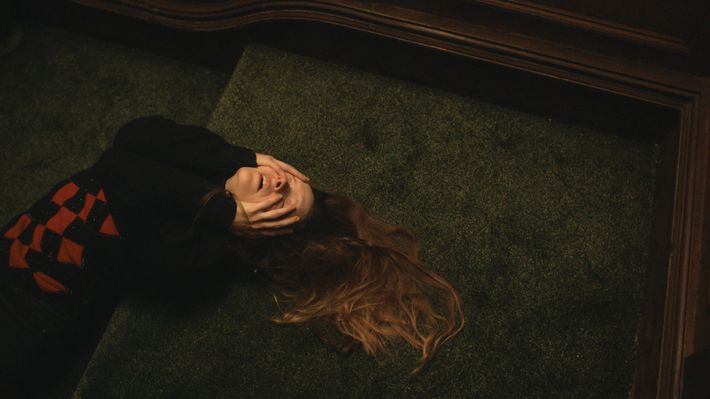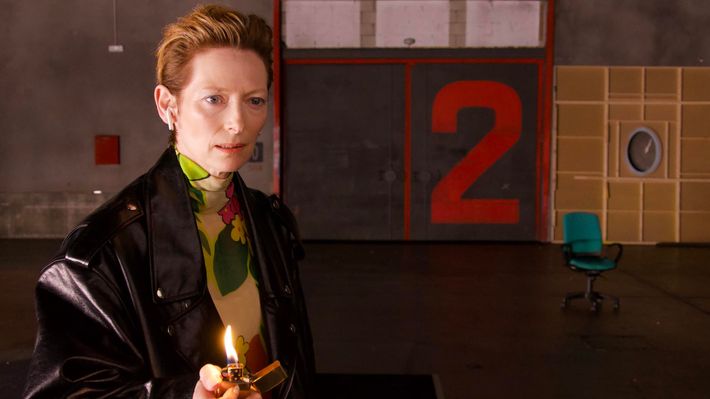
Theaters are cautiously reopening, Cannes is back on the calendar (with fingers crossed) for July, and jittery studios have been shuffling around release dates for all the blockbusters that were bumped from last year. In other words: Movies are back, baby! Though, of course, they never really went away. Even in these early months of 2021, streaming and on-demand releases have offered up a slew of treasures worth seeking out, from a tender documentary about stray dogs on the streets of Istanbul to a delirious Kristen Wiig comedy about two Midwestern women finding themselves (and stopping an archvillain) while vacationing in Florida. Here are the best movies Vulture has seen and, in many cases, reviewed so far this year, according to critics Bilge Ebiri and Alison Willmore.
(A reminder about methodology: This list is restricted to films that have had their first official release in 2021 — so no The Father, Minari, Night of the Kings, or Nomadland, which all had qualifying runs in 2020 — and we will continue to update it throughout the year.)
JanuaryMaud, the hospice nurse played with electric conviction by Morfydd Clark, is either possessed by the Holy Spirit or something darker. What’s so cunning about writer-director Rose Glass’s debut is how little that matters, because Maud’s newfound religious fervor has an intensity that’s terrifying either way. Having reinvented herself after a traumatic work incident as an ecstatic ascetic who believes that God has a special purpose in store for her, Maud gloms onto her latest client, a choreographer with terminal lymphoma played by Jennifer Ehle, sure that she’s supposed to save the embittered bohemian’s soul. Disaster seems inevitable, but what makes Saint Maud so nail-bitingly tense is that it’s impossible to guess the form in which it’ll come, especially as we become immersed in Maud’s warped, hallucinatory way of seeing the world.—Alison Willmore
(Available to stream on Amazon, Sling TV, and Philo.)
Simon Stone’s The Dig opens sometime in the 1930s with humble excavator and amateur archeologist Basil Brown (Ralph Fiennes) being called to the stately Suffolk home of wealthy widow Edith Pretty (Carey Mulligan) to dig up a series of large, mysterious mounds on her property. Soon enough, he’s uncovering something far grander than anyone previously imagined — an entire ship buried underground, the tomb of an ancient Anglo-Saxon king and proof that the people who inhabited this land were more than mere Vikings. As the dig goes on and our characters learn more about the past and the people who came before them, the small gestures of their own lives begin to feel both inconsequential and seismic. To convey these seemingly paradoxical ideas, Stone and screenwriter Moira Buffini adopt an elliptical, glancing style that treats the present almost as if it were already a memory. Scenes weave in and out of each other. Conversations happen without anyone moving their mouths, the sounds of one intimate moment intruding on the images of another. Time jumps backward and forward. Death is intercut with passion, as tragedy and glory tangle onscreen. It’s as if the dig itself radiates out a new understanding of existence, revealing both the broad arc of history and the curlicues of love, loyalty, and loss that abound within it.—Bilge Ebiri
(Available to stream on Netflix.)
Initially intended to be the site of a reservoir but never actually filled up, Vacaresti Nature Park has stood in the center of the Romanian capital of Bucharest for decades, neglected by bureaucrats and slowly emerging as a rich marshland with startling biodiversity, the largest urban wilderness in Europe. It’s also the unofficial home of a man named Gica Enache, who, with his wife and nine children — not to mention a few pigeons, chickens, dogs, cats, and pigs — has resided here for nearly 20 years, away from the world in a kind of impoverished, idyllic life off the grid. Shot over three years, Radu Ciorniciuc’s film follows Gica and his family as their existence is interrupted by the growing demands of the modern world. But Acasa is not exactly a movie about paradise lost. Ciorniciuc seamlessly blends intimacy and lyricism with a clear-eyed honesty about what he’s depicting. The film comes in at under an hour and a half, but we see Vacaresti transformed and the Enache family sent into an existential tailspin. Over and over in this poisoned pastoral, the lost dream of the idyll clashes with the sad workings of reality.—B.E.
(Available to rent on Amazon, YouTube, Google Play, and Vudu.)
Kristen Wiig and Annie Mumolo play a pair of midwestern best friends who head to sunny Florida and find themselves in a heap of trouble. It might look on its surface like the zany, mass-appeal comedies on which Wiig has built much of her success. But make no mistake about it — this is weirdo cinema all the way, filled with non sequiturs, oblique cutaways, and an impressive level of commitment to the bit from its stars. Delivering their lines with complete-each-other’s-sentences brio, Wiig and Mumolo give off all the charming energy of a duo who have built these characters over a lifetime. Special mention must go to Jamie Dornan’s conflicted and lovesick villainous henchman Edgar, who gets one of cinema’s great musical numbers, flouncing, splitting, leaping, and twirling around on a beach, singing lines like “I’m going up a palm tree / Like a cat up a palm tree / Who’s decided to go up a palm tree” and “Seagull on a tire, can you hear my prayer?”—B.E.
(Available to purchase on Amazon, YouTube, Google Play, and Vudu.)
The first time Abigail (Katherine Waterston) kisses Tallie (Vanessa Kirby), she blurts out, with the astonishment of someone whose universe has just tilted on its axis, “You smell like a biscuit.” Mona Fastvold’s film is the latest in what’s become a trend of lesbian period romances, but it’s unique in being set in the 1800s in the wilds of New York state, where Abigail and Tallie are unhappily married to neighboring farmers — the stolid Dyer (Casey Affleck) and the controlling Finney (Christopher Abbott), respectively. Theirs is a difficult way of life, with the women having little by way of freedom or relief from the isolation, and Finney, in particular, becoming increasingly resentful of Tallie’s lack of interest in what he believes are her wifely duties. But the friendship and then the love that arises between Abigail and Tallie is portrayed as a delight in a world almost entirely devoid of such an emotion, something to be greedily held onto even as any future it could have is desperately uncertain.—A.W.
(Available to rent on Amazon, YouTube, Google Play, and Vudu.)
Rodney Ascher’s documentary exploration of simulation theory is stuffed with ideas and stories and builds toward the kind of emotional conclusion one would not expect from a movie so immersed in abstract thought. It’s also just plain creepy: Ascher structures his journey around footage of a 1977 lecture by visionary sci-fi author and legendary paranoiac Philip K. Dick, who declares to an audience in Metz, France, that we are living in a computer-programmed reality, one of many. Dick looks and feels like a cult leader, assured in his lunacy. Significantly less intimidating, Ascher’s other interview subjects (who include artists, scientists, and researchers) are hyperintelligent, articulate, and entertaining. The temptation is great to sit there and poke holes in their so-called evidence, but the tenor of the film isn’t one of doubt or ridicule. For the most part, these people’s stories aren’t all that bizarre or surreal; they are universal and relatable. Ultimately, A Glitch in the Matrix becomes a film not about whether we’re living in a simulation but about the many understandable reasons someone may think this. In effect, it winds up being about the mysteries of the human experience.—B.E. (Available to rent on Amazon, YouTube, Google Play, and Vudu.)
My ZoeIt may take some emotional fortitude to make it through the first half of Julie Delpy’s devastating parental drama. Watching Delpy’s single mom shower affection and attention on her young daughter, always looking out for the child’s safety, it’s hard not to get a sense that something truly horrible is about to happen. And be prepared — it does. But also know this: This film also features Daniel Brühl, and once he shows up, it gets way crazier and more entertaining. My Zoe is a strange, moving picture about how we process grief — or, in some cases, fail to — but it’s also a powerful and complex exploration of scientific, emotional, and familial ethics. And it ends on one of the most subtly unsettling images in recent memory.—B.E.
(Currently unavailable to stream.)
There are only a couple of jump scares in Canadian writer-director-cinematographer-editor-composer-visual-effects-artist Anthony Scott Burns’s Come True — mild ones at that — but the movie’s elusive sense of menace lingers for days, weeks, possibly forever. It’s about a troubled 18-year-old insomniac (Julia Sarah Stone) who signs up for a sleep study and winds up getting pulled further into her nightmares. There’s a bare-bones story there, and an insane howler of a twist at the very end, but the film’s most indelible moments come whenever Burns portrays the unnerving, spectral world of our heroine’s dreams, with their grim, surreal imagery. The movie captures something elemental, a vague but familiar terror scratching at the edge of our consciousness.—B.E.
(Available to rent on Amazon, YouTube, Google Play, and Vudu.)
A princess story by way of a dystopian action adventure, Raya and the Last Dragon is Disney displaying how ably it’s about to adapt its animated formula to the blockbuster era. Its heroine (Kelly Marie Tran) is both the daughter of the chief and a fiercely determined martial artist. Its requisite adorable animal sidekick, the armadillo-pill-bug hybrid Tuk Tuk, is also a trusty steed capable of navigating Raya through chase sequences. But while Raya and the Last Dragon can feel slick to a fault, its Southeast Asia–inspired fantasy realm is beguiling and beautifully rendered. And for all the trundling forward motion of its save-the-world narrative, the film still has bursts of genuine heart — many of them courtesy of Sisu, the innocent and generous dragon of the title, who’s winningly voiced by Awkwafina.—A.W.
(Available to purchase on Disney+, Amazon, YouTube, and Google Play.)
Weighing in at a backbreaking four hours and two minutes, the so-called Snyder Cut – effectively restoring the version of Justice League director Zack Snyder wanted to make before departing the project in 2017 — sprawls, and scatters, and loses itself in story lines. There are times when you’re convinced it’s entering the final act, only to realize there are still more than two hours to go. But lose all these melodramatic curlicues and oversize narrative distractions, and you’d lose what makes the film special. There, in its great, glorious bloat, lies the movie’s heart. You can sort of understand why length-concerned executives might have wanted the running time cut in half and the story spruced up with dumb jokes and fewer subplots. But there’s nothing cynical about Snyder’s indulgence: He believes that superheroes directly tie into our ancient myths and religious symbols, and he wants to make the rest of us believe too. He repeatedly goes overboard with the ritual and the portent and the stone-faced gravity, but it’s hard not to respect the guy. The Snyder Cut has its share of problems — when you get the best of Snyder, you also get the worst — but it’s an undeniably passionate and moving work. It earns its self-importance.—B.E.
(Available to stream on HBO Max.)
Pedro Almodóvar’s English language debut is a divine half-hour short in which Tilda Swinton gets tired of being trapped in her apartment, puts on a pair of gold lamé pants, and burns the whole place down. Relatable! The Human Voice is a loose adaptation of Jean Cocteau’s 1930 monodrama, which is entirely composed of a woman speaking and pleading on the phone with an unseen lover who has left her to marry someone else. Almodóvar’s interpretation turns the work into an ode to the deliciousness of melodramatic impulses, with Swinton pacing her home — exquisitely furnished, and quickly revealed to have been built entirely on a soundstage — in AirPods, and also downing a colorful but nonlethal handful of pills and taking an ax to her ex’s favorite suit, all in an effort to free herself from the shadow of their relationship.—A.W.
(Available in select theaters.)
It might not be entirely accurate to call the new Eric Andre film a prank comedy, since prank comedies often turn on making unsuspecting people look like idiots. Bad Trip, while absurdly funny, doesn’t really take aim at its unwitting bystanders; the film is refreshingly free of cynicism. Most of the people who get pulled into Andre and co-stars Lil Rel Howery and Tiffany Haddish’s gags seem to be helpful, tolerant, sensible — which seems downright shocking at a moment in time when we’ve all been told that we hate each other’s guts. It wouldn’t have been hard to accelerate these situations to the point where everyone began to act like jerks, and one presumes plenty of stuff has been cut out. The film’s generosity toward our fellow humans feels purposeful — and it’s genuinely moving—B.E.
(Available to stream on Netflix.)
A kind of companion to Kedi, that 2016 documentary about Istanbul’s street cats, Elizabeth Lo’s film is a tender look into the lives of some of the city’s free-roaming dogs. It’s also, inevitably, a dog’s-eye view portrait of the Turkish metropolis, with Lo setting her camera on the level of her four-legged subjects but also catching the human dynamics happening around them. In particular, she lets her expressive main character, a tan-colored lovely named Zeytin, bring the audience into the lives of a group of Syrian refugees living covertly on a construction site. Stray doesn’t need to push the point that the wild dogs are welcomed more freely than these painfully young men, who huff glue and sell packets of Kleenex to get by while being denied work permits. To exist from day to day is an animal’s prerogative, but it’s a lot harder on humans who can’t conceive of what their life will look like a week, a month, or a year from now.—A.W.
(Available to rent on Amazon, YouTube, Google Play, and Vudu.)
To try to describe a SpongeBob Squarepants movie is to flirt with madness. This one follows SpongeBob and his best friend Patrick as they go on a dream quest/road trip to the Lost City of Atlantic City, a glittering, neon-drenched metropolis where the vain, domineering King Poseidon is keeping SpongeBob’s pet snail, Gary, captive, using its slime for facials that keep his face young and healthy. It’s all a scheme engineered by the show’s primary nemesis, Plankton, who comes up with this demonic plot only after yet another of his attempts to land the secret recipe for Krabby Patties ends with him getting stuck in a French-fry cutter and having the long slivers of his sliced-up body dumped into an industrial-strength deep fryer, an image more unsettling than anything the horror genre has given us in years. Along the way, there’s a Western ghost town populated by zombie cowboys; a rolling, sentient tumbleweed soothsayer known as Sage, portrayed by a gently aflame Keanu Reeves; a whole bit where they become gambling addicts and lose their minds; an elaborate courtroom trial; and at least two covers of “My Heart Will Go On.” It’s Thelma and Louise meets The Quick and the Dead meets Inception meets Barb and Star Go to Vista del Mar meets Rain Man meets Inherit the Wind, and somehow it’s also a summer-camp movie?—B.E.
(Available to stream on Paramount+ and to rent on YouTube, Google Play, and Vudu.)
If you subscribe to a service through our links, Vulture may earn an affiliate commission.
"movie" - Google News
April 05, 2021 at 11:30PM
https://ift.tt/3mjd0Rd
The Best Movies of 2021 (So Far) - Vulture
"movie" - Google News
https://ift.tt/35pMQUg
https://ift.tt/3fb7bBl
Bagikan Berita Ini



















0 Response to "The Best Movies of 2021 (So Far) - Vulture"
Post a Comment